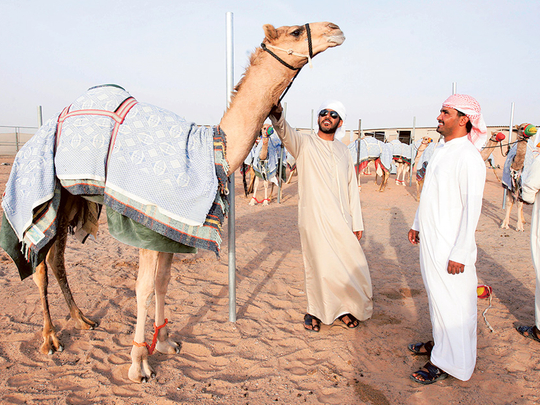
Abu Dhabi: Every evening, Mohammad Obaid Al Ameri makes it a point to visit his camel farm and discuss the animals over a cup of Arabic coffee.
Gulf News visited Al Ameri’s farm at Al Hayer — around 50km from Al Ain city — and found Al Ameri and his circle of relatives and friends discussing the elegant animals that are an intrinsic part of the UAE’s heritage.
Al Ameri turned out to be a treasure trove of anecdotes about camels.
“Among the many anecdotes on a camel’s attachment to its owner, the most touching one goes like this,” Al Ameri, 31, a government employee, said. “When a camel-owner died, his visibly upset camel stopped eating and drinking and the mourning family subsequently found that the camel had disappeared from its pen.”
After an extensive search, the family found the camel at the graveyard where the owner was buried. “Sitting near its master’s grave, the camel was making strange noises and seemed to be crying,” Al Ameri said. The family was surprised at how the camel found its way to the graveyard and was able to identify the master’s grave.
“Some camels identify people by their scent,” Al Ameri said. “This camel probably followed the scent of its master to the grave. Refusing to eat and drink, the camel would not move from the grave despite the family’s best efforts to bring it back to the farm. On the third day, it was found dead by the grave,” Al Ameri said.
The tale underlines the deep bond Emiratis share with their camels.
“We love camels, not as animals, but as part of our family. They are a part of our identity as well,” Al Ameri said.
“I am a Bedouin; my father is a Bedouin; my grandfather and forefathers were Bedouins and the presence of camels in our families is the testimony that we are Bedouins.” Al Ameri said, his eyes shining with pride.
Al Ameri never misses a visit to his camel farm — every day after work. He keeps his camels in two separate farms — one is for racing camels and the other for milking and breeding camels. His milking camels are not for commercial purposes, but for family use. “We Bedouin tend to them like others rear cows and goats for milk,” Al Ameri said.
At his farm for racing camels, Al Ameri segregates young and old animals since those under one year of age need special care and training.
Al Ameri pointed to 40 or so camels on this farm. “Most of them are 6-8 months old,” he said. “The untrained young camels cost between Dh30,000 and Dh50,000.”
As racing camels have a very good demand in the market, this traditional hobby gives Al Ameri a sizeable income.
“If you can properly identify the breed by tracing its father and mother, the price of the camel gets costlier. Such a camel costs between Dh150,000-Dh200,000.”
However, not all camels end up race-worthy after training. Only a few are able to go the distance and win prizes. “Out of 40, you will get about three or four racing camels,” Al Ameri explained.
Winning a camel race may fetch you huge prize money and luxury cars, “but more than the money, it is the prestige attached to owning the fastest camels that matters”.
Camels, he said, represent the prestige of a tribe. “We will go to any extent to retain that honour. We will even die for them. There have been instances in the past where tribes have fought wars over camels. If someone from one tribe took away a camel belonging to another, the onus was on the owner to bring it back, whatever the cost, even if he had to pay with his life,” Al Ameri said.










